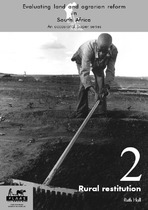Evaluating land and agrarian reform in South Africa : Rural restitution
Abstract
During the negotiated transition to democracy, many South Africans expected that liberation would bring the return of land they had been dispossessed of under colonialism and apartheid, but the terms on which the transition was negotiated constrained the parameters of how this could happen. The African National Congress (ANC) did not advocate nationalisation of land at the Convention for a Democratic South Africa (Codesa) constitutional negotiations and later adopted a willing buyer-willing seller approach to land reform. Both the ‘interim’ Constitution of 1993 and the ‘final’ Constitution of 1996 guaranteed the protection of existing property rights, while also placing clear responsibility on the state to implement land reforms.
The aim of the restitution programme is to restore land rights or provide other redress to those unfairly dispossessed since the introduction of the Natives Land Act 27 of 1913. Restitution is to address the loss of land rights that resulted from homeland consolidation, forced removals from ‘black spots’, the Group Areas Act and related laws that designated land on a racial basis. Between 1960 and 1983 alone, an estimated 3.5 million people were forcibly removed (Platzky & Walker 1985:9–12). As acknowledged in the White Paper on South African Land Policy, ‘[f]orced removals in support of racial segregation have caused enormous suffering and hardship in South Africa and no settlement of land issues can be reached without addressing such historical injustices’ (DLA 1997:28).

